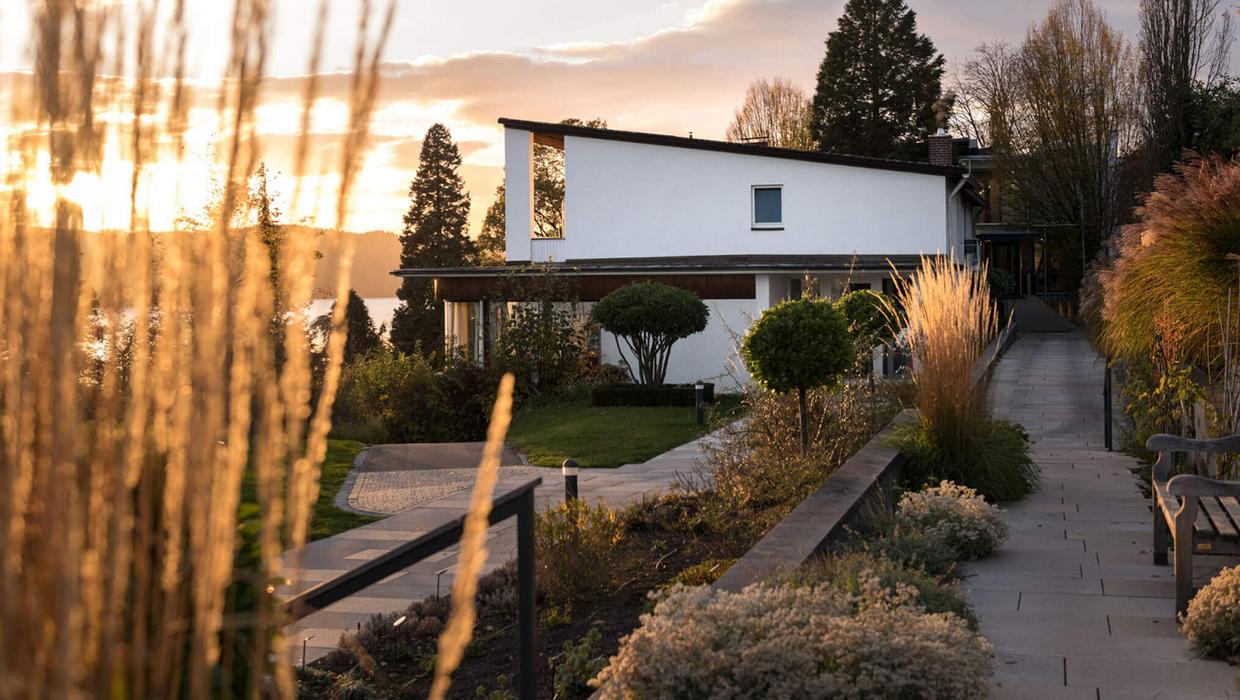
There isn’t a third person in our marriage but there is a rival. My husband is passionate about a family-run fasting clinic in Uberlingen, overlooking Lake Constance, Germany.
e goes alone twice a year and was there at the beginning of lockdown. He happily remained there for six weeks unable to get home.
Buchinger Wilhelmi was founded 70 years ago by Otto Buchinger, a medical officer in the navy who cured himself of paralysis caused by rheumatic fever by fasting for 19 days in 1918.
Now one of the world’s leading therapeutic fasting centres, Buchinger is run by Otto’s great-grandson Leonard Wilhelmi. The German government demanded that the clinic remain open during lockdown, to be available for Covid patients. But after Easter, having taken the requisite health and hygiene precautions, they encouraged guests. They are currently full with “a completely different clientele”, according to owner, Raimund Wilhelmi (Otto’s grandson). “Normally, two thirds of our guests are repeat guests.
Now, 50pc have come for the first time and they are much younger. People are waking up to a new awareness about health as Covid affects everybody.” His son Leonard adds: “The main causes in violent reactions to Covid are diabetes, high blood pressure and being overweight.
We have been treating these conditions for decades and our goal is now to equip people with a better immune system.” The minute my husband heard about their new immune-boosting programme, he signed us up for two weeks’ “holiday” in August.
This was an extravagance at a cost of more than £2,000 a person. After an hour in this sleek minimalist medical centre, my 16-year-old daughter burst into tears. All her “boarding-school issues” were ignited.
My inner rebel similarly baulked at the first 24 hours that we had to spend eating in our rooms, until the results of our Covid tests, taken on arrival, came through. (Thankfully they were negative or we would have been quarantined in our rooms for our entire stay.) Thank goodness the clinic does not advise couples share rooms – 80pc of guests go alone – so we each had our own room.
As Andrew was doing the full 10-day fast of 250 liquid calories a day, which I couldn’t stomach (I was on 800 solid calories a day and Daisy, 1,800), a shared room would have destroyed our marriage.
Not because Andrew had an enema on the bed every other day but because his preternatural joy freaked us out.
Until we were fully institutionalised the stricture wore us out. Every morning at 7am, you visit the nurse who weighs you, takes your temperature and your blood pressure.
Mornings are spent exercising – there are daily two-hour organised hikes and a schedule of excellent exercise classes. Every morning, I swam in Lake Constance, which saved my sanity. Lunch – divine organic vegetarian food, which is frankly ingenious as 800 calories seems abundant – is at midday. Then at 1pm, the entire clinic goes to bed for a hot liver compress.
There is a collective sepulchral calm as a nurse enters your room to place a warm flannel and hot water bottle on your abdomen. You are swaddled in a thin sheet and tucked into bed. Bliss. As the liver and gall bladder busy themselves detoxifying, you sink into a grateful sleep. An hour later, a nurse brings you a pot of apple tea. Then more exercise.
Supper is at 6.30pm, then it’s early to bed. I marvelled at how long and how well I slept, averaging at least 10 hours a night. A panoply of blood tests on arrival, included in the package, revealed that my main problem was vitamin D deficiency. A good level is 60, mine was 27.
Vitamin D was prescribed and if I had needed them, vitamin infusions of B and C would have been recommended, too. The medical care here is outstanding. A lung scan was also on offer at a superior local clinic if necessary for pesky Covid symptoms. Dr Francoise Wilhelmi de Toledo, the scientific director, explained the benefits of fasting; both full fast and intermittent fasting – where you go from 12 to 16 hours without eating. “When you fast, all your digestive processes are in rest.
Without needing the energy to digest, all stresses are diminished and you actually need less immunity. During this time, you change your microbiome. You stimulate the lungs, skin, kidneys, liver and the system itself triggers autophagy; an extraordinary capacity of the body to eliminate damaged cellular structures. When you fast, you activate stem cells to rejuvenate immune cells.”
On a full fast, it is important that food is carefully reintroduced. The clinic insists that you stay for three days after fasting ends for “regeneration” so you don’t start overworking your body too early. On departure, I had lost 2.5kg, 3cm from my waist and reduced my BMI from 23.5 to 22.7.
My daughter’s teenage spots cleared up and my husband lost 7kg. It wasn’t exactly a holiday – at varying times we all felt extreme anger, sadness and, thankfully, side-splitting hilarity.
Emotional detox is real. But we returned home on a health high. My biggest shift is that I no longer fear hunger. Dr Francoise recommends waiting an hour when you feel hungry, which I now do. This has sustained my weight loss. My husband was right – the investment into our health has paid off.
